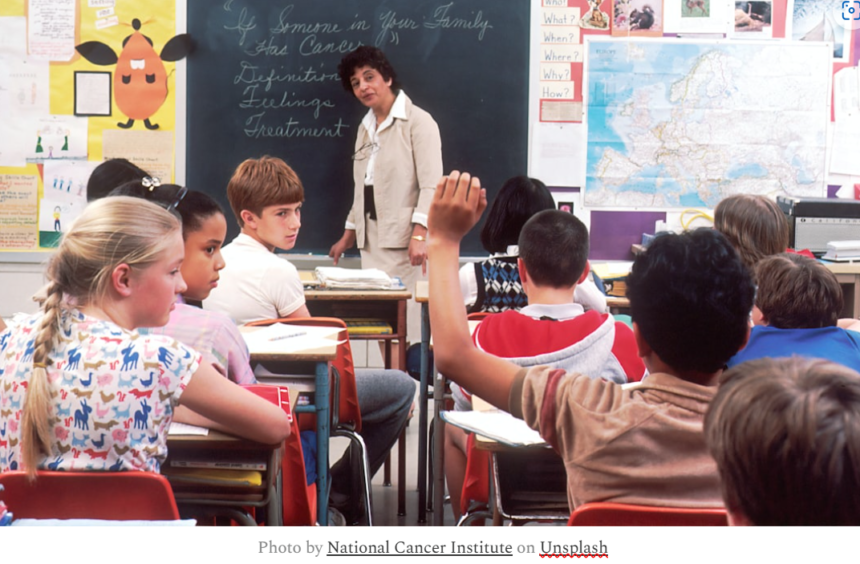
To dismiss public schools as “failing” is to cheapen the achievements of students who reach for it, and show the way for elevating the bar for all.
Using standardized tests to measure academic achievement is hardly a new idea. America has a long history of experimenting with ways to measure outcomes.
Few efforts have been as intense, however, as what started as the No Child Left Behind Act passed in 2001, which opened the floodgates on high-stakes testing.
Over the majority of my career in journalism, I’ve argued vigorously against these exams for a range of reasons.
At the core of my concerns with such tests, however, is the reality that they force schools and teachers to look at students not as individuals whose needs, abilities, and readiness for education span a vast spectrum, but as so many parts rolling off an assembly line, where producing perfect parts is the goal. Anything less is failure.
One particularly ugly underbelly of this “data-tization” of students is the gross oversimplifications that people draw about what’s really happening in our schools.
Take, for example, the notion that public schools are “failing,”
This is often based on standardized test scores cherry-picked from high-level data points that fail to capture the intricacies of realities in any classroom.
This is not to suggest that standardized tests in and of themselves are useless. Matt Hurt has been a leader in Virginia in using SOL data and other research to fashion what has arguably been one of the more-successful programs in the country for turning around schools and districts — the Comprehensive Instructional Program (CIP).
In particular, this program has taken one of Virignia’s poorest regions—Southwest Virginia—and turned it into one of the top-scoring regions on the SOL in the commonwealth. And he’s used this same approach to turn around other schools and districts in Virginia.
Defining Succes
Why has the discourse around public education become so toxic? There is no one answer to this, of course, but one that I would posit is people have little agreement over what success in public education means.
When NCLB was launched in 2001, it set a goal for proficiency that could best be described as optimistic. Others described it as unrealistic. Few believed it was achievable.
“Each State shall establish a timeline for adequate yearly progress. The timeline shall ensure that not later than 12 years after the end of the 2001-2002 school year, all students…will meet or exceed the State’s proficient level of academic achievements on the State assessments….” No Child Left Behind Act of 2001
Source: What’s Proficient? The No Child Left Behind Act and the Many Meanings of Proficiency (ed.gov)
Clearly, that goal failed.
So how do we define success? Is 100% proficiency in English and Math the goal? Should it be every student graduating with a certification in some aspect of business that makes them employable, a la Gov. Glenn Youngkin? How about the goal being every child is college-ready, even if they choose not to attend?
There is merit to each of these. And they suffer from the same fatal flaw. Forcing students into boxes that will work for some and leave many behind.
That’s a tragedy, but it’s far from the worst tragedy.
By saying that public education is a failure, we diminish the achievements of the many, many students who achieve at very high levels.

Recently, districts have begun to recognize success at all levels. In Stafford County, Decision Day is about recognizing the many and varied paths students take.
The division’s goal is for every graduating senior to have a plan to either enter the workforce, enlist in the military, or pursue higher education.
Decision Day is “more than just a ceremony; it’s a testament to the hard work and future aspirations of each and every student,” the school division’s press release about the event states. “Whether they’re joining the military, pursuing higher education, or entering the workforce, every decision is a choice worth celebrating.”
This is a positive step in the right direction. Not least because it makes abundantly clear that our public schools, for their many shortcomings and struggles— and few who work in the system would deny these issues exist—do enjoy success.
The key to improving our educational system is not found in bashing test scores and students. It’s found in discovering what’s working and scaling it up.
That may prove to be one of Stafford Superintendent Thomas Taylor’s legacies whenever he decides to move on.
The Best of the Best
This move to celebrate wherever people are hoping to find success post-high school reflects an effort to recognize that people want, and strive for, many different things. By screaming failure across the board at public education, we do a disservice to the good that is happening.
And we undersell the best of the best.

Success in high school is no guarantee of success tomorrow. People must prove themselves day-in and day-out. People who graduate from Harvard fail in life. And people who graduate from community college or choose the military go on to make significant contributions to the world and our nation.
But success when we find it is worth celebrating.
This morning, Stafford County Public Schools released the names of the Valedictorians and Salutatorians for each of its high schools.
At a time when it’s popular to scream that public schools are failing, remember these students and their achievements.
They deserve our respect. And they make clear that our public schools, while far from perfect, are also far from complete failures.
Congratulations to these students in Stafford for their remarkable achievements, and to all students everywhere across the region who are finding success. In these students and their successes rests the key to raising the bar for everyone.
Stafford County Public Schools Top Academic Students for 2024
Brooke Point High School
Rena Amankwa-Asare
GPA: 4.9191
Next Stop: William & Mary
Isabella Kang
GPA: 4.9142
Next Stop: Colorado College
Colonial Forge High School
Aditya Biswas
GPA: 4.912
Next Stop: Princeton University
Hannah Jenkins
GPA: 4.803
Next Stop: University of Arkansas
Mountain View High School
Delainey Hinson
GPA: 5.006
Next Stop: Southern Methodist University
Katherine Buckman
GPA: 4.979
Next Stop: Columbia University
North Stafford High School
Andrea Vargas
GPA: 4.865
Next Stop: Yale University
Ella Wendel
GPA: 4.647
Next Stop: College (to be determined)
Stafford High School
Richard Oti
GPA: 4.986
Next Stop: Massachusetts Institute of Technology
Mailynn Nguyen
GPA: 4.964
Next Stop: Princeton University





